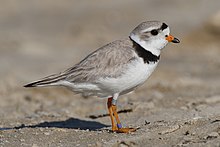Gruimorphae
| Gruimorphae | |
|---|---|

| |
| Piping plover (Charadrius melodus) | |

| |
| Water rail (Rallus aquaticus) | |
| Scientific classification | |
| Domain: | Eukaryota |
| Kingdom: | Animalia |
| Phylum: | Chordata |
| Clade: | Ornithurae |
| Class: | Aves |
| Infraclass: | Neognathae |
| Clade: | Neoaves |
| Clade: | Gruimorphae Bonaparte, 1854 |
| Orders | |
| Synonyms | |
| |
Gruimorphae[4] is a clade of birds that contains the orders Charadriiformes (plovers, gulls, and allies) and Gruiformes (cranes and rails) identified by molecular analysis.[5][3] This grouping has had historical support, as various charadriiform families such as the families Pedionomidae and Turnicidae were classified as gruiforms.[6][7][8] It may also have support from the fossil record since the discovery of Nahmavis from the Early Eocene of North America. [9]
The relationship between these birds is due to similar anatomical and behavioral characteristics. A morphological study went further to suggest that the gruiforms might be paraphyletic in respect to the shorebirds, with the rails being closely related to the buttonquails.[10][11]
References
- ^ Mourer-Chaviré C. (1995) The Messelornithidae (Aves: Gruiformes) from the Paleogene of France. - Cour. Forsch.-Inst. Senckenberg, 181: 95-105
- ^ Mayr, Gerald (2016). Avian evolution: the fossil record of birds and its paleobiological significance. Topics in Paleobiology. Wiley-Blackwell. p. 306. ISBN 978-1-119-02076-9.
- ^ a b Kuhl, H.; Frankl-Vilches, C.; Bakker, A.; Mayr, G.; Nikolaus, G.; Boerno, S. T.; Klages, S.; Timmermann, B.; Gahr, M. (2020). "An unbiased molecular approach using 3'UTRs resolves the avian family-level tree of life". Molecular Biology and Evolution. 38: 108–127. doi:10.1093/molbev/msaa191. PMC 7783168. PMID 32781465.
- ^ "TiF Checklist: GRUAE I: Opisthocomiformes & Gruiformes". www.jboyd.net. Retrieved 10 April 2018.
- ^ Jarvis, E.D.; et al. (2014). "Whole-genome analyses resolve early branches in the tree of life of modern birds". Science. 346 (6215): 1320–1331. Bibcode:2014Sci...346.1320J. doi:10.1126/science.1253451. PMC 4405904. PMID 25504713.
- ^ Huxley T.H. On the classification of birds; and on the taxonomic value of the modifications of certain of the cranial bones observable in that class. Proceedings of the Zoological Society of London. 1867;1867:415–472.
- ^ Lowe P.R. An anatomical review of the ‘waders’ (Telmatomorphæ), with special reference to the families, subfamilies, and genera within the suborders Limicolæ, Grui-Limicolæ and Lari-Limicolæ. Ibis. 1931b; 73: 712–771
- ^ Lowe P.R. On the relations of the Gruimorphæ to the Charadriimorphæ and Rallimorphæ, with special reference to the taxonomic position of Rostratulidæ, Jacanidæ, and Burhinidæ. Ibis. 1931a; 73: 491–534
- ^ Musser, G. & Clarke, J.A. (2020). "An Exceptionally Preserved Specimen From the Green River Formation Elucidates Complex Phenotypic Evolution in Gruiformes and Charadriiformes". Frontiers in Ecology and Evolution. 8. doi:10.3389/fevo.2020.559929.
- ^ Livezey, B. C.; Zusi, R. L. (2007). "Higher-order phylogeny of modern birds (Theropoda, Aves: Neornithes) based on comparative anatomy. II. Analysis and discussion". Zoological Journal of the Linnean Society. 149 (1): 1–95. doi:10.1111/j.1096-3642.2006.00293.x. PMC 2517308. PMID 18784798.
- ^ "Neognathia". www.helsinki.fi. Retrieved 10 April 2018.
